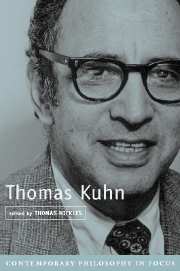Book contents
- Frontmatter
- Contents
- Contributors
- Preface
- Introduction
- 1 Kuhn and Logical Empiricism
- 2 Thomas Kuhn and French Philosophy of Science
- 3 Normal Science and Dogmatism, Paradigms and Progress: Kuhn ‘versus’ Popper and Lakatos
- 4 Kuhn's Philosophy of Scientific Practice
- 5 Thomas Kuhn and the Problem of Social Order in Science
- 6 Normal Science: From Logic to Case-Based and Model-Based Reasoning
- 7 Kuhn, Conceptual Change, and Cognitive Science
- 8 Kuhn on Concepts and Categorization
- 9 Kuhn's World Changes
- 10 Does The Structure of Scientific Revolutions Permit a Feminist Revolution in Science?
- Selected References in English
- Index
2 - Thomas Kuhn and French Philosophy of Science
Published online by Cambridge University Press: 07 December 2009
- Frontmatter
- Contents
- Contributors
- Preface
- Introduction
- 1 Kuhn and Logical Empiricism
- 2 Thomas Kuhn and French Philosophy of Science
- 3 Normal Science and Dogmatism, Paradigms and Progress: Kuhn ‘versus’ Popper and Lakatos
- 4 Kuhn's Philosophy of Scientific Practice
- 5 Thomas Kuhn and the Problem of Social Order in Science
- 6 Normal Science: From Logic to Case-Based and Model-Based Reasoning
- 7 Kuhn, Conceptual Change, and Cognitive Science
- 8 Kuhn on Concepts and Categorization
- 9 Kuhn's World Changes
- 10 Does The Structure of Scientific Revolutions Permit a Feminist Revolution in Science?
- Selected References in English
- Index
Summary
There is very little to be said about direct influences of twentieth-century French or German philosophers on Kuhn's work (or vice versa, for that matter). He did strongly appreciate Émile Meyerson's approach to the history of science but expressed distaste for Meyerson's idealism; and, as we will see, he had a brief but unproductive encounter with Gaston Bachelard. Beyond this, Kuhn seems to have had very little direct contact with European philosophy.
It is, of course, possible to plot various parallels between Kuhn's philosophy of science and the general trend of European thought from Heidegger through Derrida. Post-Kuhnianism and postmodernism oppose a similar range of Cartesian theses and pose the standard skeptical threats of a radically historicized reason. But beyond the broadest generalizations, there is little substantial overlap between Kuhn's philosophical interests and inclinations and those of, say, Heidegger and Derrida.
The one movement in twentieth-century European thought that has substantive affinities with Kuhn's work is the French tradition of philosophy of science. This begins with the classic writings of Poincaré, Duhem, and Meyerson but takes on its distinctive character (and its strongest similarities to Kuhn) in the work of Léon Brunschvicg, Gaston Bachelard, and Georges Canguilhem. Kuhn himself, unfortunately, had only a glancing contact with this tradition and no serious understanding of it. The main contact came through Koyré, who had urged him to meet Bachelard and provided a letter of introduction.
- Type
- Chapter
- Information
- Thomas Kuhn , pp. 45 - 64Publisher: Cambridge University PressPrint publication year: 2002

